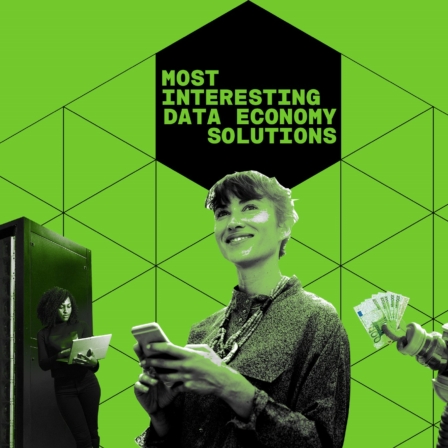A large proportion of Finns are part of a grocery store’s customer loyalty programme. They collect a huge amount of data on Finnish consumer behaviour, which the chains use to develop their business and promote their sales.
K and S Groups themselves believe that customer loyalty programmes also benefit customers, who benefit from offers and additional services. Both chains have apps based on their loyalty programmes where consumers can track their purchase data.
“There are not many apps in the world that return processed purchase data to consumers. Consumers are not the same, which is why the app also has different views,” says Heini Dahlström, Account Director at S Group.
The data processed for customers is visualized and structured to make it easier for customers to find information that interests them in the app. Its metrics and nutritional algorithm have been developed together with Helsinki University.
Data helps customers implement their own consumption. While Dahlström, for example, uses the app to check the nutritional value and healthiness of the food she buys, many S Group customers use the My Purchases service to evaluate purchases that match their values, such as monitoring the degree of domestic origin and carbon footprint of their purchases. The service also allows them to compare prices and monitor the proportion of vegetables in their purchases.
Minna Vakkilainen, Vice President of Data, Analytics and Loyalty (K-Plussa) at Kesko, says that more and more attention is being paid to healthier choices in grocery stores, which is reflected in the consumption habits of those who use K Group’s K-food app. The service therefore aims to make it easier to make choices that support well-being. The user can set well-being goals, monitor their achievement and compare them with nutritional recommendations.
“It’s not enough for consumers to see what they have bought. They also want to understand what can be deduced from the purchase data and how to act on it,” says K Group’s Vakkilainen.
The apps generate purchase recommendations for consumers and in practice promote the sales of grocery chains. K Group’s Vakkilainen assures that the recommendations are based on Finnish nutritional recommendations and user data, such as what restrictions or goals they have set for their diet, for example. The nutritionist has been involved in developing the service.
“We don’t rank products in order of profitability or put our own brands at the top of product recommendations in the customer view of the app. Otherwise, we would not be on a sustainable basis,” says Vakkilainen.
According to Vakkilainen, consumers can benefit from the purchase data collected by the app, for example, by receiving recipe suggestions based on their own goals and nutritional recommendations. The ingredients can be added to the shopping basket with just a few clicks.
Purchase data is useful, perhaps for everyone
The presence of promotion in apps does not necessarily conflict with the principles of a fair data economy Fair data economy The part of the economy that focuses on creating services and data-based products in an ethical manner. Fairness means that the rights of individuals are protected and the needs of all stakeholders are taken into account in a data economy. Open term page Fair data economy . In its simplest form, fairness means taking into account the interests of individuals, businesses and society.
While apps drive business sales, they also return visualised and processed data for customers to use and benefit from.
Transparency is key. Kesko has listed its own ethical principles for the use of AI on its website and publishes annual data balance sheet that shows how data collected from consumers is used. A data balance sheet is a report the organisations voluntarily compile to show how they implement data protection and data security.
“To be transparent, we must have the courage to disclose the principles by which we operate. The published principles also serve as internal guidelines for us,” says Vakkilainen.
According to S Group’s Dahlström, the company has to continuously discuss internallly how and according to what principles it makes recommendations to its customers. According to Dahlström, it is important that the service is transparent about all processed purchase data and various ways it can be used. The My Purchases service serves as an analysis tool for the customer himself.
Dahlström says that according to a study conducted by the Research Institute of the Finnish Economy (Etla), women under the age of 35 and women among S Group’s customers have used the My Purchases calculator to change their purchasing behaviour, especially when it comes to fruit and vegetables.
Sharing comprehensive purchasing data with third parties is still under consideration
It would be in line with the principles of fair data economy if the data collected through customer loyalty programmes could also be used by third parties, such as organisations,with the consumer consent. For example, data from grocery chains could be used by growth companies that develop apps that promote well-being. This would require that data is shared in line with common rules and permits.
So far, S Group has collaborated with the LoCard research project of the Universities of Tampere and Helsinki. The project has studied such things, as sustainable diet, food choice motives and the carbon footprint of purchases.
Kesko also does not exclude the possibility of sharing data with third parties in the future, if it is done with the customers’ consent and if it can be used to produce a service or feature that benefits the customer and that would not be possible without opening the interfaces.
For the time being, however, it is relying on more limited partnerships: K Group is currently involved in, for example, a project with the Finnish Institute for Health and Welfare and a number of cities to study the possibilities of using different data sources in promoting health and wellbeing. The aim is to provide cities and municipalities with up-to-date and varied information on residents’ well-being and health challenges locally, so that decisions to promote well-being can be increasingly based on diverse and high-quality information.
Purchasing data encourages more informed decisions and guides chain procurement
Since October 2023, customers have been able to view their own purchases on K Group’s K-Food app from different perspectives, such as domestic origin, carbon footprint or nutritional choices, even since 2015. The service has been developed together with customers and new features will be introduced in the near future, for example in the area of vitamins.
According to Vakkilainen, K Group’s customers have asked that, in addition to purchasing history and the development of the use of individual ingredients, such as salt, the app should provide product-level information. For example, what proportion of a customer’s salt intake comes from packaged rye bread.
“It is only when the customer sees concretely how different product choices affect the whole that insights will emerge and behaviour change.”
According to Heini Dahlström of S Group, by monitoring and returning purchase data, S Group helps individuals to act more consciously. On the other hand, the information gained from purchasing data also steers the procurement of both chains in an increasingly responsible direction.
“Changes in individual behaviour have major systemic effects. Data collected from consumers provides direct inputs to companies’ production processes and selection planning,” says Dahlström.



